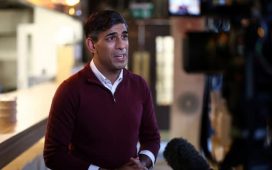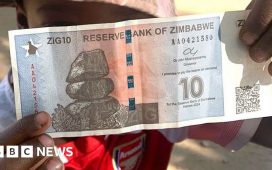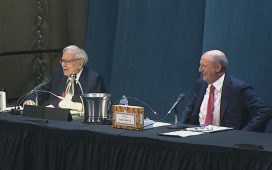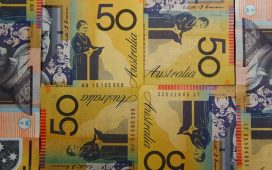Rishi Sunak was said to be “too busy” on Thursday morning to read the 108-page report that trashed the reputation of Boris Johnson. He might have enjoyed it. “They really hate each other — it’s personal,” said one cabinet minister.
The report by the House of Commons privileges committee, with its litany of findings of lying and contempt against Johnson, would normally be enough to finish off any political career. But Johnson has always played by different rules.
Sunak is treating the report like a lump of Kryptonite, initially wary of endorsing its findings or condemning Johnson, fearing a backlash from a rump of MPs and among party members still loyal to their former leader.
The privileges committee on Thursday appeared to place Johnson’s political career into a coffin, but the lid is still open. Sunak, so far at least, appears very wary of trying to nail it shut.
Downing Street said that not only was Sunak preoccupied with other business on Thursday, it could not even say if the prime minister would attend Monday’s House of Commons vote on whether to approve the report.
Tellingly, Conservative MPs may also skip it, as the whips are granting “slips” — permission to be away from the Commons — on Monday to any Tory who agrees to go out and campaign in one of the seats facing a by-election. The aim is to dial down the drama.
Conservative HQ on Thursday refused to say whether Johnson would be barred from standing as a Tory candidate in future. “He’s not on the candidates list — we’ll cross that bridge when we come to it,” said one official.
Johnson ultra-loyalist Sir Jacob Rees-Mogg said he expected Sunak would recognise his predecessor as a “huge campaigning asset” in the general election campaign and would support his return to the candidates list.
Blocking Johnson from standing for a seat “would look very petty, and one thing we know about Rishi Sunak — I’m not his greatest admirer, but — he is not petty,” said Rees-Mogg.
On the face of it, Johnson’s political career should be terminated by Thursday’s report, even if the former prime minister has insisted that he has only stood down as an MP “for now”.
If MPs approve the report on Monday, he will be the first prime minister ever to have been found to have lied to the House of Commons and he will have his security pass — normally given to ex-MPs — withdrawn.
“I don’t see how he can come back from this,” said Sir Bob Neill, Conservative chair of the Commons justice committee, lamenting the way Johnson had quit parliament last week with a tirade against Tory MPs on the committee. “He seems to have gone full Trump.”
Sir Gary Streeter, a longstanding Tory MP, said simply: “He is finished in politics full stop.”
Sunak, for all his personal animus towards Johnson, is hoping his party and the country will draw that conclusion too.
But Johnson, even at this moment of disgrace, still poses a threat to Sunak at a time when the prime minister is dealing with a host of other problems, including rising mortgage rates and stubbornly high inflation.
On Monday, Tory divisions will be on show again when MPs vote on the report, fuelling claims by Labour leader Sir Keir Starmer that the party is too self-absorbed to focus on the issues facing the country.
Nadine Dorries, a Johnson ally who is stalling on her threat to stand down as an MP, said: “Any Conservative who would vote for this report is fundamentally not a Conservative and will be held to account by members and the public. Deselections may follow. It’s serious.”
Even among some moderate Conservative MPs there was a feeling that the seven-member cross-party committee had gone a little too far in saying Johnson — had he still been an MP — should have been suspended from the Commons for 90 days.
One Tory MP said: “The length of the potential ban is surprisingly long, so I think that will buy Boris a lot of sympathy. I know a lot of MPs are in two minds about it [the vote on the report] already.” Johnson’s strong support among the party grassroots is one factor giving some of his colleagues pause for thought before backing the committee’s verdict.
Those close to the committee say that the suspension might have been more like 20 days if Johnson had not aggravated things by criticising its work, and accusing the MPs compiling the report of being involved in a “political hit job”.
The report said Johnson had been “complicit” in a campaign of abuse and intimidation, with committee members having to have extra security. “He’s behaving like a pound-shop Trump,” said Angela Rayner, deputy Labour leader.
One committee member said: “It has been horrible. To end up being in the eye of the storm on a daily basis, with people sending messages that have been deranged or unhinged, doesn’t make things very pleasant.”
Nevertheless, it is easy to see how Johnson will seek to claim that some MPs share his view that he has been unfairly treated by an “establishment” still smarting over his role in delivering Brexit.
Newspaper columns will inevitably follow, with Johnson setting himself up as a victim of a stitch-up and making life as awkward as possible for Sunak ahead of the general election expected next year.
Posing as a proven election winner and champion of lower taxes and less regulation — policies he failed to deliver while prime minister with an 80-seat majority — his message might resonate with the Tory base, especially when amplified through friendly newspapers.
“I don’t think there’s any chance he’ll stand at the next election,” said one cabinet minister.
But if Johnson did put his name forward as a potential candidate, there would be a big question about whether Sunak and the party machine would block him, sparking more Tory turmoil.
If Sunak lost the 2024 election, would Johnson, if he were back in parliament, be a viable candidate to succeed him? “You wouldn’t bet against him,” said one senior Tory MP. Johnson’s game is always to keep his options open.
Johnson’s hero Winston Churchill served for six years as Tory opposition leader from 1945-51 but the parallels are not exact. Churchill had just won the second world war, whereas Johnson has just been ejected from the House of Commons in ignominy.











